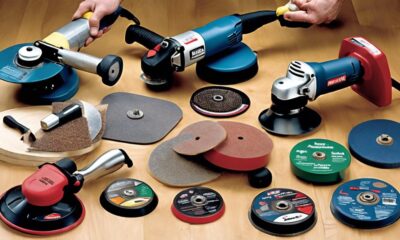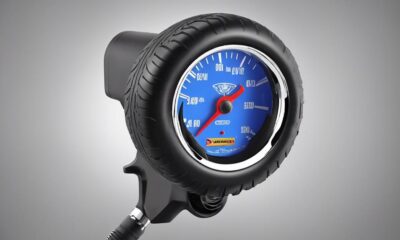Beginners Guides
Cold Air Return in Basement
2025
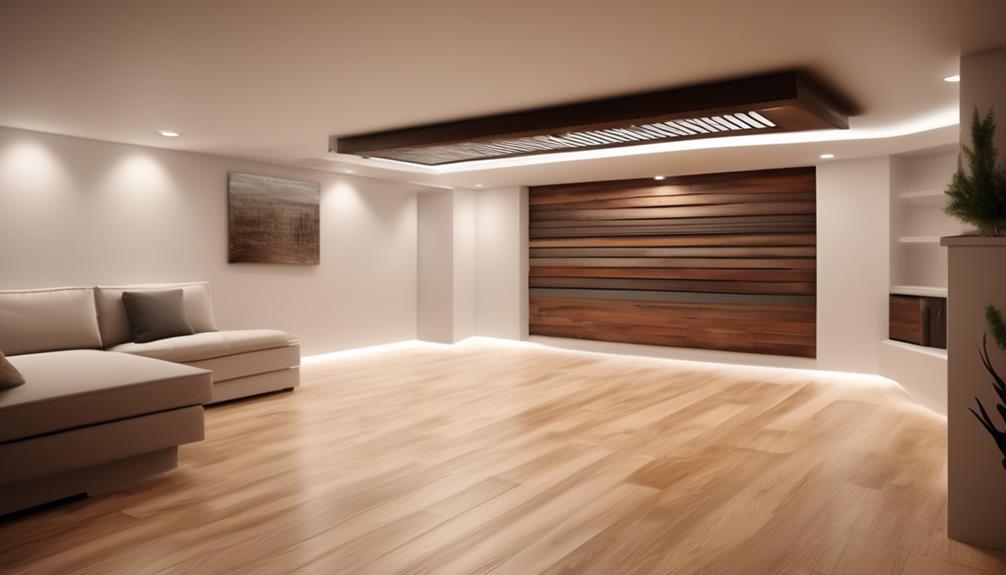
We have all been in a basement that feels colder than a livable space, almost like a refrigerator. One common worry is that installing a cold air return might make this problem worse.
However, when properly installed and maintained, a cold air return can actually improve the comfort and air quality of your basement.
But how exactly does it work, and what are the specific benefits of having one in your basement?
Let's explore the ins and outs of cold air returns and how they can make your basement a more inviting and comfortable space.
Key Takeaways
- Cold air returns are crucial for maintaining proper air circulation and temperature control in basements.
- They prevent basements from becoming damp and musty by drawing in cooler air from the basement.
- Cold air returns regulate temperature and prevent moisture buildup, contributing to improved air quality and a healthier living environment.
- Proper installation, maintenance, and care of cold air return systems maximize their effectiveness and enhance energy efficiency.
Importance of Cold Air Returns in Basements
In a basement, cold air returns are crucial for maintaining proper air circulation and temperature control. Basement ventilation is often limited, and without proper air circulation, basements can become damp and musty. Cold air returns play a vital role in combating these issues by allowing the circulation of air throughout the space.
When warm air rises, it creates a pressure difference that draws in cooler air from the basement through the cold air returns. This process helps to regulate the temperature and prevent the buildup of moisture, ultimately contributing to a more comfortable and healthier basement environment.
Effective air circulation is essential for preventing stagnant air, which can lead to mold and mildew growth. Cold air returns facilitate the movement of air, preventing it from becoming trapped in the basement. Additionally, they help in distributing heat evenly throughout the space when the heating system is in use.
Proper air circulation also aids in reducing the workload on the HVAC system, leading to improved energy efficiency. Therefore, ensuring the presence and functionality of cold air returns is integral for maintaining a well-ventilated and comfortable basement environment.
Benefits of Installing a Cold Air Return

Installing a cold air return enhances basement ventilation and contributes to improved air quality and temperature regulation. The benefits of installing a cold air return include:
- Improved Energy Efficiency: By installing a cold air return in the basement, the overall energy efficiency of the HVAC system is enhanced. This is achieved by ensuring that the system can effectively circulate and distribute air throughout the basement, leading to more efficient heating and cooling.
- Cost Savings: With improved energy efficiency comes cost savings. Proper ventilation and air distribution facilitated by a cold air return can lead to lower energy bills due to optimized heating and cooling processes.
- Enhanced Air Quality: A cold air return helps in the circulation of air, preventing stagnation and promoting the removal of stale air, dust, and pollutants. This results in improved air quality throughout the basement, creating a healthier and more comfortable living environment.
Factors to Consider for Cold Air Return Installation
Consider the basement layout and existing HVAC system when determining the optimal location for the cold air return. The installation location should be strategically chosen to ensure efficient airflow and temperature distribution throughout the basement. Additionally, sizing considerations are crucial to ensure that the cold air return is adequately sized to accommodate the airflow requirements of the space. Below is a table outlining key factors to consider for cold air return installation:
| Factors to Consider | Details |
|---|---|
| Installation Location | Place the cold air return in a central location to allow for even distribution of air throughout the basement. Ensure it is not obstructed by furniture or other obstructions. |
| Sizing Considerations | Calculate the required CFM (cubic feet per minute) for the basement space to determine the appropriate size for the cold air return. Consider the size of the return grille and ductwork to ensure proper airflow.
Tips for Maximizing Cold Air Return Effectiveness
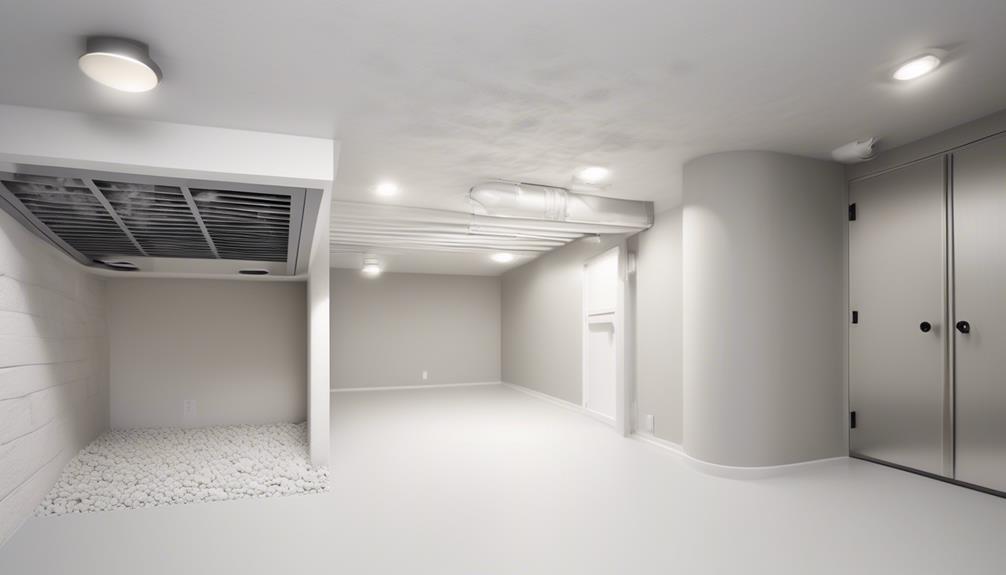
Maximizing the effectiveness of the cold air return involves strategically placing the return in a central location to ensure even airflow throughout the basement, while also ensuring it's unobstructed.
To maximize the effectiveness of the cold air return in your basement and ensure proper air circulation, consider the following tips:
- Seal Duct Leaks: Inspect the ductwork for any leaks and seal them properly. Leaks can lead to loss of air pressure and reduce the efficiency of the system, impacting overall air circulation in the basement.
- Use High-Quality Filters: Opt for high-quality air filters to trap dust, debris, and allergens effectively. This not only enhances air quality but also prevents the accumulation of particles that can obstruct airflow through the cold air return.
- Regular Maintenance: Schedule regular maintenance for your HVAC system to keep it running at its best. This includes cleaning or replacing filters, checking for blockages, and ensuring the system operates at optimal energy efficiency.
Maintenance and Care for Cold Air Return Systems
Ensuring regular maintenance and care for cold air return systems is crucial for optimizing their performance and extending their lifespan. Dust prevention is key to maintaining the efficiency of the system. Regularly changing or cleaning the air filters is essential to prevent dust and debris buildup, which can hinder airflow and reduce the system's effectiveness. Cleaning the vents and ductwork with a vacuum or duster can also help prevent dust accumulation.
In addition to dust prevention, proper insulation is vital for enhancing energy efficiency. Ensuring that the ductwork is well-insulated can prevent heat loss in the winter and heat gain in the summer, reducing the workload on the system and lowering energy costs. Options for insulation include foil-backed foam board, fiberglass insulation, or spray foam insulation. Properly insulating the ductwork can also help maintain a consistent temperature throughout the home.
Regular maintenance and care for cold air return systems not only optimize their performance but also contribute to energy efficiency and cost savings. By implementing dust prevention and insulation techniques, homeowners can ensure that their systems operate effectively and efficiently.
Frequently Asked Questions
Can I Install a Cold Air Return in My Basement if I Already Have a Heating and Cooling System in Place?
Yes, you can install a cold air return in your basement even if you already have a heating and cooling system in place. It's essential to ensure the proper size and location of the cold air return to optimize basement ventilation and maintain energy efficiency.
Additionally, incorporating a cold air return can make you eligible for energy efficiency incentives. It's a technical process, but with the right expertise, it can enhance the effectiveness of your existing HVAC system.
Are There Any Specific Building Codes or Regulations I Need to Be Aware of When Installing a Cold Air Return in My Basement?
Building codes for cold air return installation vary by location. Compliance with these codes is crucial to ensure safety and efficiency. Prior to installation, researching local building codes and regulations is essential.
Installation requirements may include specific duct size, clearances from combustible materials, and proper sealing to prevent air leakage. Professional advice and permits may be necessary to adhere to these codes and ensure a successful installation.
What Are Some Common Mistakes to Avoid When Installing a Cold Air Return in a Basement?
When installing a cold air return in a basement, it's crucial to avoid common mistakes. Proper sizing ensures efficient airflow, preventing strain on the HVAC system. Improper installation can lead to air leaks and reduced efficiency.
Airflow direction must be carefully considered to prevent recirculating cold air. It's essential to consult building codes and regulations to ensure compliance.
Professional installation and regular maintenance are key to a well-functioning cold air return system.
Are There Any Energy Efficiency Incentives or Rebates Available for Installing a Cold Air Return in My Basement?
We've found that there are various energy efficiency incentives and rebates available for implementing cold air returns in basements. These incentives aim to promote energy conservation and may include financial benefits such as tax credits or utility rebates.
It's crucial to conduct a cost-benefit analysis to determine the potential savings and the installation process. This technical approach helps ensure the best outcome for energy efficiency and financial gains.
How Can I Determine the Right Size and Location for a Cold Air Return in My Basement?
To determine the right size and location for a cold air return, we consider airflow requirements, ensuring optimal performance. The benefits include improved air circulation and more efficient heating and cooling.
We assess the size based on the volume of the area it serves and position it strategically to maximize airflow. These considerations optimize the system's efficiency and ensure a balanced temperature throughout the space.
Should I Be Concerned About the Cold Air Return in My Basement If I Notice Signs That a Ceiling Fan Might Fall?
If you notice warning signs of falling for your ceiling fan in the basement, it’s important to address the issue as soon as possible. While the cold air return in the basement may not be directly related to the fan’s stability, it’s still crucial to ensure all components are properly maintained.
Conclusion
So, as we've learned, cold air returns are essential for basement ventilation and comfort.
While it may seem ironic that 'cold' air is actually beneficial, it's important to remember that proper airflow is key to maintaining a healthy and comfortable living space.
By following the tips and considering the factors we've discussed, you can maximize the effectiveness of your cold air return system and ensure a well-ventilated basement.
- About the Author
- Latest Posts
Introducing Ron, the home decor aficionado at ByRetreat, whose passion for creating beautiful and inviting spaces is at the heart of his work. With his deep knowledge of home decor and his innate sense of style, Ron brings a wealth of expertise and a keen eye for detail to the ByRetreat team.
Ron’s love for home decor goes beyond aesthetics; he understands that our surroundings play a significant role in our overall well-being and productivity. With this in mind, Ron is dedicated to transforming remote workspaces into havens of comfort, functionality, and beauty.
Beginners Guides
The Best Time to Go on a Cruise for Perfect Weather
Sail through the maze of climate patterns to uncover the best times for perfect weather on a cruise, ensuring a memorable voyage awaits.

When it comes to choosing the best time to go on a cruise for perfect weather, it's like steering a maze of climate patterns to find that golden ticket. But fear not, as we have the compass to guide you in the right direction.
Understanding the seasonal nuances can make all the difference between a sun-kissed voyage and a rainy retreat. So, grab your sunscreen and pack your bags as we uncover the best times to set sail for idyllic weather conditions that will make your cruise a memorable experience.
Key Takeaways
- Caribbean cruises: December to mid-April for best weather conditions
- Alaskan cruises: Late June to mid-July for breathtaking landscapes
- Mediterranean cruises: April-May & September-October for ideal weather
- Hawaii cruises: Summer and fall months for dry weather and sunny skies
Ideal Months for Caribbean Cruises
For ideal weather conditions and a pleasant cruising experience in the Caribbean, consider booking your voyage between December and mid-April. During this period, the Caribbean boasts the best weather for cruises, with dry conditions and sunny skies prevailing. This stretch offers a fantastic opportunity to soak up the sun, enjoy water activities, and explore the stunning destinations in the region without the worry of rainstorms or excessive humidity.
Late summer into fall presents the cheapest time for Caribbean cruises, making it an excellent choice for budget-conscious travelers looking to experience the beauty of the Caribbean without breaking the bank. By opting for a cruise during this period, you can take advantage of lower prices and fewer crowds while still enjoying the warm waters and picturesque landscapes the Caribbean is known for.
Avoiding the peak season from December to April is advisable for those seeking a more peaceful and wallet-friendly experience. Sailing in late June through August allows travelers to steer clear of the crowds, particularly families on vacation during school breaks, making for a more relaxed and intimate cruise experience.
Optimal Weather for Alaskan Cruises
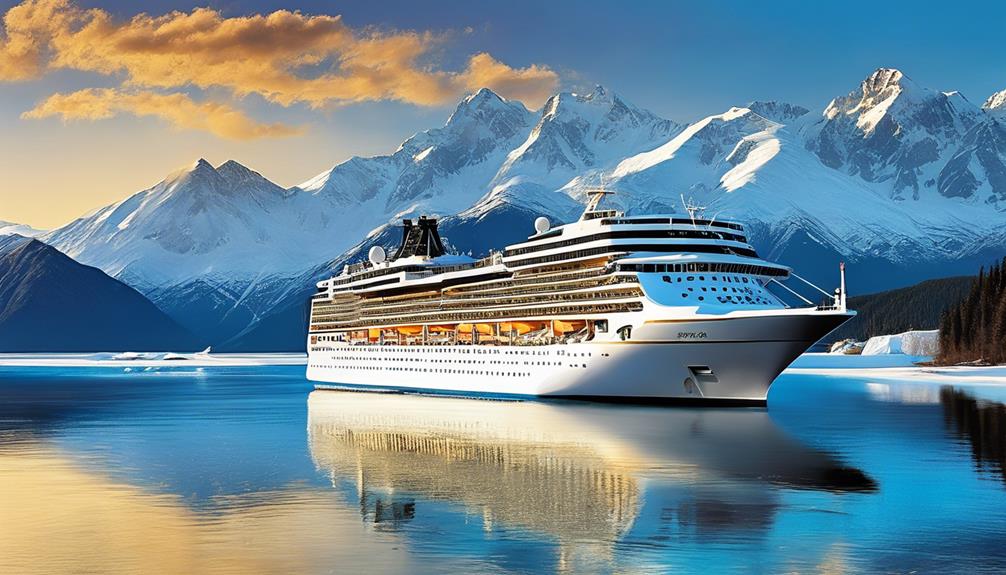
To maximize your Alaskan cruise experience, targeting late June through mid-July guarantees ideal weather conditions for enjoying the breathtaking landscapes and wildlife sightings in the region. During mid-July, you can witness the spectacular salmon run season, where various wildlife, including bears and bald eagles, gather along the rivers for this perfect phenomenon.
Late August to mid-September is another excellent window for Alaskan cruises, offering pleasant weather and often lower prices as it marks the end of the peak season. If your focus is on spotting whales, August is the prime time for your cruise, as these majestic creatures are commonly seen during this period.
For those seeking a balance between affordability and decent weather, mid-May to early June also presents a good opportunity to explore Alaska on a cruise. Keep these ideal weather periods in mind when planning your Alaskan adventure for an unforgettable experience.
Perfect Seasons for Mediterranean Cruises
April-May and September-October stand out as the prime seasons for Mediterranean cruises, offering ideal weather conditions and fewer crowds for a delightful experience exploring the region. During these shoulder seasons, the Mediterranean boasts milder temperatures and a more relaxed atmosphere compared to the peak tourist season in July and August. Traveling in April or May allows for pleasant sightseeing without the sweltering heat or overwhelming crowds. Likewise, September and October provide a serene setting for cruising with comfortable weather and less tourist congestion.
Additionally, prices for Mediterranean cruises tend to be lower from May to November, making it a cost-effective option for travelers seeking a budget-friendly voyage. Consider booking a Mediterranean cruise in May 2024 with MSC starting at $499/person to enjoy the perfect blend of favorable weather and affordable prices.
- Ideal weather conditions
- Fewer crowds
- Milder temperatures
- Lower prices during shoulder seasons
- Peak tourist season in July and August
Prime Time for Hawaii Cruises
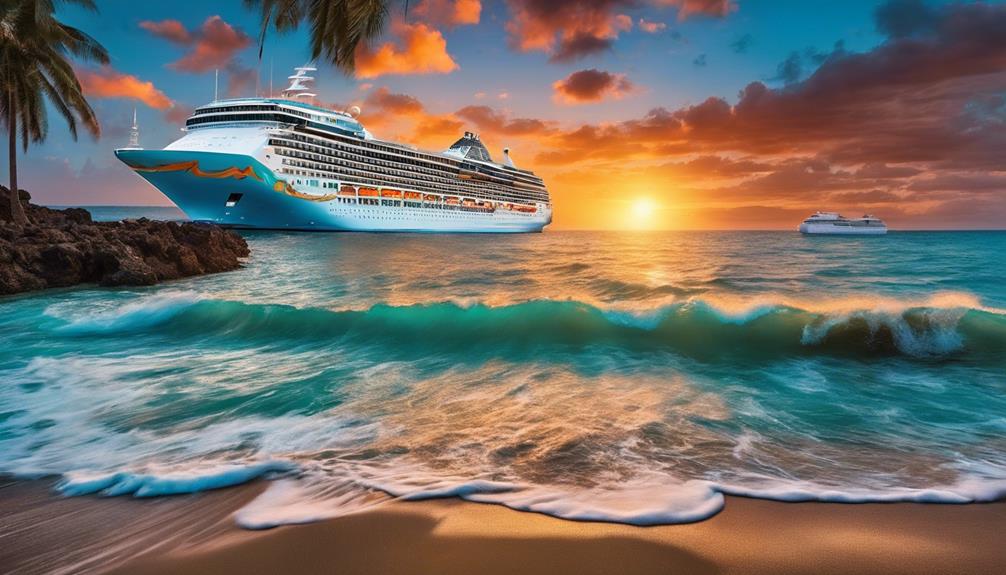
The best time to start on a Hawaii voyage is usually during the summer and fall months when the weather is dry and the skies are sunny. Hawaii cruises are particularly rewarding from mid-September through October, offering ideal conditions for a memorable experience. If you're interested in whale watching, the period from late October through May is perfect for spotting these majestic creatures in their natural habitat. During this time, the weather remains pleasant, with minimal rainfall from August through October, ensuring a smooth sailing experience.
For travelers seeking a cost-effective option, January through March can be a good time to contemplate a Hawaii cruise, although weather conditions may vary slightly. These months often offer competitive pricing and fewer crowds, allowing you to enjoy the beauty of Hawaii at a more relaxed pace. Whether you're into adventure, relaxation, or simply soaking in the stunning scenery, a Hawaii cruise during the summer and fall months promises an unforgettable journey.
Best Weather for Australia & New Zealand Cruises
For those considering voyages beyond Hawaii, exploring the best weather for Australia & New Zealand cruises becomes paramount, especially as these regions offer unique experiences throughout the year. When planning your cruise to Australia and New Zealand, keep in mind the following key points for an enjoyable voyage:
- November to March: This period offers warm temperatures and sunny weather in major ports like Sydney, making it the best time to go on a cruise in Australia & New Zealand.
- Early February to mid-March: Experience the warmest weather in Australia during these months, ensuring a comfortable cruise.
- New Zealand's Climate: With a temperate climate, layering is recommended for cruises throughout the year to stay comfortable.
- Consider Off-Peak Months: October, November, or April can provide discounted fares in Australia outside the peak season, allowing for savings on your cruise.
- Reversed Seasons: Australia and New Zealand have reversed seasons compared to the northern hemisphere, influencing the ideal timing for a cruise in these regions.
Planning your trip around these factors will help you make the most of your cruise experience in Australia and New Zealand.
Conclusion
To guarantee the best time to go on a cruise for perfect weather is essential for a memorable and enjoyable experience. By researching the ideal months for different regions like the Caribbean, Alaska, Mediterranean, Hawaii, Australia, and New Zealand, you can secure smooth sailing and sunny skies.
Don't just take our word for it, investigate the truth of this theory yourself and discover the magic of cruising in ideal weather conditions.
- About the Author
- Latest Posts
Introducing Ron, the home decor aficionado at ByRetreat, whose passion for creating beautiful and inviting spaces is at the heart of his work. With his deep knowledge of home decor and his innate sense of style, Ron brings a wealth of expertise and a keen eye for detail to the ByRetreat team.
Ron’s love for home decor goes beyond aesthetics; he understands that our surroundings play a significant role in our overall well-being and productivity. With this in mind, Ron is dedicated to transforming remote workspaces into havens of comfort, functionality, and beauty.
Beginners Guides
The Best Time to Cruise for Budget-Friendly Deals
Fulfill your wanderlust dreams without draining your wallet by learning the key to scoring budget-friendly cruise deals.
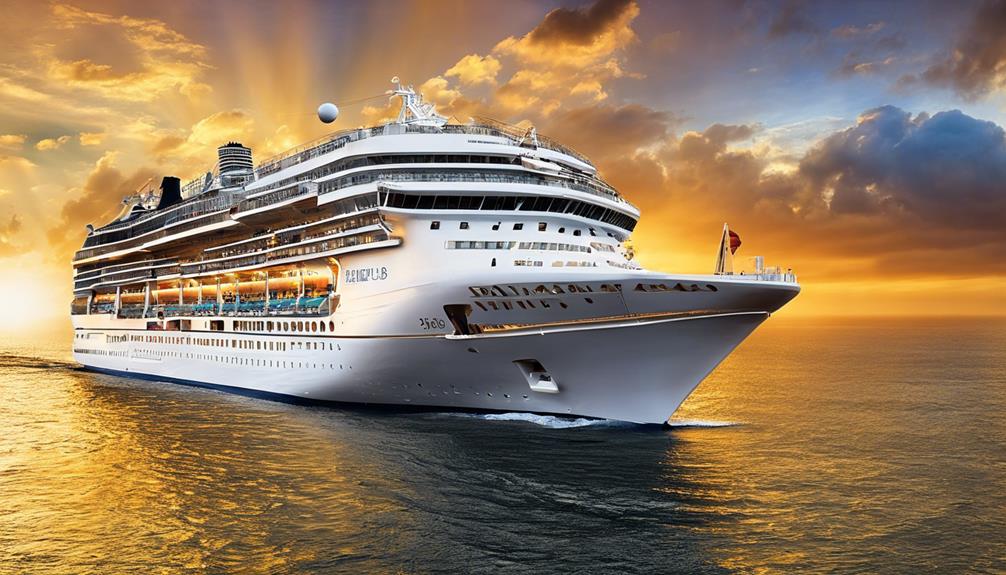
When it comes to finding budget-friendly cruise deals, timing is key. Imagine setting sail on the crystal blue waters of the Caribbean or exploring the stunning glaciers of Alaska without breaking the bank.
There's a specific window of opportunity that savvy cruisers keep an eye on to secure the best rates and save some serious cash. But how do you know when to book your next adventure to make the most of your budget?
Let's uncover the secrets behind scoring the ultimate cruise deals and making your dream vacation a reality.
Key Takeaways
- Booking during wave season in January to March ensures budget-friendly deals.
- Monitoring prices post-booking for drops leads to potential refunds or upgrades.
- Repositioning cruises in spring and fall offer cost-effective options.
- Leveraging loyalty programs maximizes savings for affordable cruising.
Ideal Seasons for Budget-Friendly Cruises
When seeking budget-friendly cruise deals, timing plays an important role in securing the best value for your money. Shoulder seasons such as September, October, and early December present excellent opportunities for travelers looking for cheaper fares. These off-peak times often offer discounted rates and fewer crowds, making it an ideal choice for budget-conscious individuals.
Additionally, booking during wave season in January and February can lead to significant discounts and promotions, maximizing savings on your cruise vacation.
Repositioning cruises during spring and fall are another fantastic option for savvy travelers seeking affordable deals. These cruises often provide cost-effective choices as cruise lines move their ships between different regions.
Avoiding major holidays and school breaks is also key to securing cheaper cruise fares and ensuring a more relaxed cruising experience. Moreover, sailing from Florida during off-peak times can offer a wide range of options and better deals for those looking to save on their cruise adventures.
Strategies for Booking Affordable Cruises
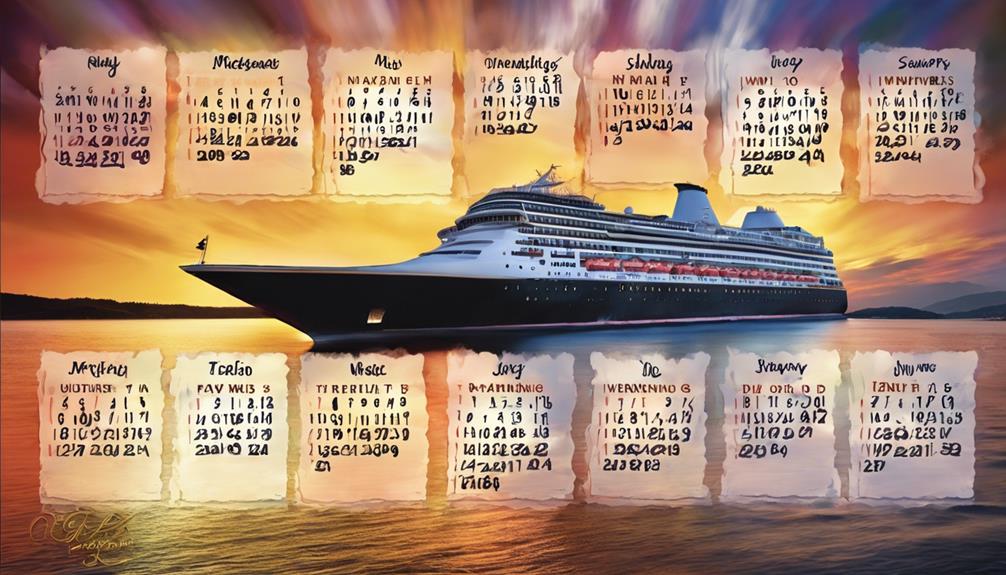
To secure the best deals on cruises, it's important to employ strategic booking approaches that maximize cost savings and value for your vacation. When aiming for budget-friendly cruise deals, consider the following strategies:
- Booking in Advance: Securing your cruise early, especially during wave season from January to March, can lead to lower rates and additional benefits.
- Monitoring Fare Changes: Keep an eye on fluctuating fares and be ready to book when prices drop to secure the best deal.
- Being Flexible with Travel Dates: Flexibility can be key in finding affordable cruise options, as adjusting your travel dates slightly can result in significant savings.
- Considering Repositioning Cruises: Exploring repositioning cruises or sailing during shoulder seasons can offer unique routes and discounted prices.
- Utilizing Loyalty Programs and Off-Peak Times: Take advantage of loyalty programs, monitor price drops, and consider traveling during off-peak times to maximize your savings on cruise vacations.
Best Times to Score Cruise Deals
During wave season from January to March, travelers can capitalize on the best times to secure budget-friendly cruise deals. Booking well in advance is key to snagging the most favorable timing and rates for your cruise.
Additionally, considering repositioning cruises during the spring and fall can offer discounted prices, making them a great option for those seeking budget-friendly deals. It's also advisable to keep an eye out for price drops even after booking, as this could potentially lead to refunds or upgrades for your cruise experience.
Leveraging loyalty programs or memberships can grant you access to exclusive discounts and savings on your upcoming cruise. By being proactive and strategic in your approach to booking and monitoring deals, you can maximize your chances of finding the best cruise deals that align with your budget and preferences.
Timing Tips for Budget-Friendly Cruises
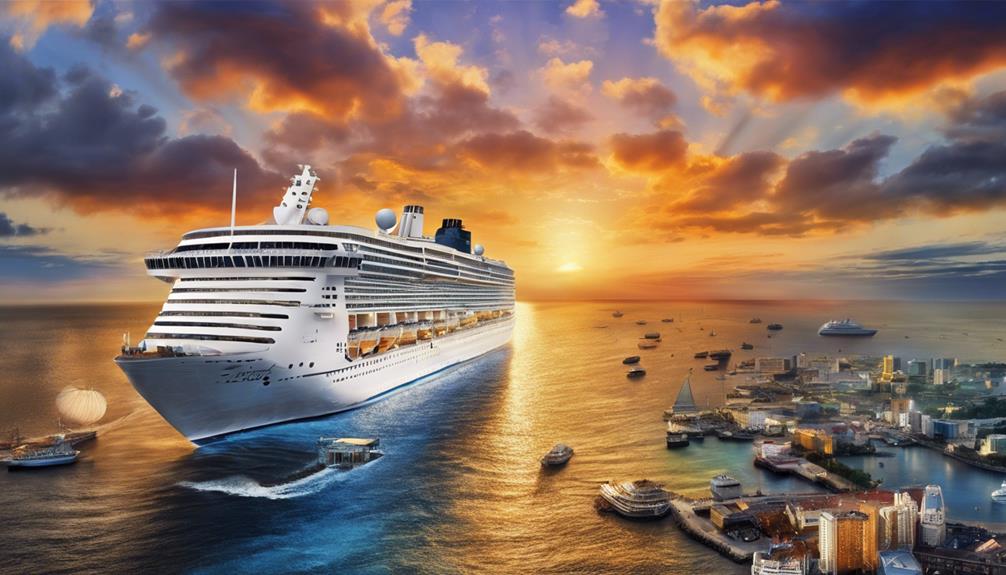
Let's explore practical strategies for maximizing your savings on budget-friendly cruises through strategic timing tips. When aiming to secure the best cruise deals that align with your budget, consider the following insights:
- Booking in Advance: Take advantage of wave season from January to March to lock in lower rates and secure desirable cabin options.
- Monitoring Prices: Keep an eye on price drops even after booking to potentially benefit from refunds or upgrades, enhancing your overall cruise experience.
- Loyalty Programs: Utilize loyalty programs or memberships to access additional discounts and exclusive perks, making your budget-friendly cruise even more cost-effective.
- Nearby Ports: Opt for cruises departing from nearby ports to save on airfare costs, enabling you to allocate more of your budget towards onboard activities and excursions.
- Discounts Galore: Embrace the array of discounts available during wave season and beyond, ensuring that you snag the best possible deal for your budget-friendly cruise adventure.
When to Book for Cruise Savings
Securing cruise savings hinges on strategic timing and proactive booking practices. To find the best deals, consider booking during wave season from January to March when many cruise lines offer enticing discounts.
Booking early not only guarantees better rates but also provides a wider selection of cabin choices. Keep an eye out for fare changes even after booking, as price drops may occur, presenting an opportunity for additional savings.
While waiting for last-minute deals can sometimes lead to the cheapest rates, this approach often comes with limited cabin availability. To stay informed about price fluctuations, utilize tools like the Shipmate app and Cruise Critic for efficient monitoring.
Conclusion
To summarize, cruising during the off-peak season can help us save some serious dough. Booking early during wave season is key to scoring those sweet deals.
So, let's set sail and make some memories without breaking the bank. Remember, early bird gets the worm – or should I say, the cruise discount!
- About the Author
- Latest Posts
Introducing Ron, the home decor aficionado at ByRetreat, whose passion for creating beautiful and inviting spaces is at the heart of his work. With his deep knowledge of home decor and his innate sense of style, Ron brings a wealth of expertise and a keen eye for detail to the ByRetreat team.
Ron’s love for home decor goes beyond aesthetics; he understands that our surroundings play a significant role in our overall well-being and productivity. With this in mind, Ron is dedicated to transforming remote workspaces into havens of comfort, functionality, and beauty.
Beginners Guides
Best Time to Go on an Alaskan Cruise for Wildlife Watching
Get ready to discover the optimal time for wildlife enthusiasts to embark on an Alaskan cruise – the ultimate season for extraordinary encounters awaits!

One could contend that any time of year is fitting for an Alaskan cruise, but if you genuinely want to maximize your wildlife watching opportunities, timing is key.
While many months offer glimpses of nature's wonders, there is a particular period that stands out above the rest.
Join us as we explore the intricacies of the Alaskan wilderness and uncover the secrets of when to set sail on a journey that promises unforgettable encounters with some of the most magnificent creatures on earth.
Key Takeaways
- Prime months for wildlife viewing in Alaska are May, June, and September.
- Peak whale watching season is from mid-June to August.
- Best time for bear spotting is between July and early September.
- Ideal months for bald eagle sightings in southeast Alaska are from May to September.
Prime Months for Wildlife Viewing
During the prime months of May, June, and September, Alaska offers the best conditions for wildlife enthusiasts to observe a diverse array of animals in their natural habitats. June marks the beginning of summer, a time when the landscape comes alive with the sights and sounds of wildlife.
July and August are ideal for witnessing brown bears fishing for salmon and catching glimpses of majestic moose roaming through the wilderness. These months provide ample opportunities for up-close wildlife viewing experiences, especially during the salmon run when bears gather along the rivers to feast.
As the summer changes into September, visitors can look forward to spotting humpback whales during their annual migration, as well as witnessing the spectacular spawning salmon and caribou herds moving across the land. The shoulder seasons offer a unique chance to explore Alaska inside and out, with fewer crowds and mosquitoes, making it an ideal time for wildlife enthusiasts to immerse themselves in the natural beauty of the region.
Peak Whale Watching Season
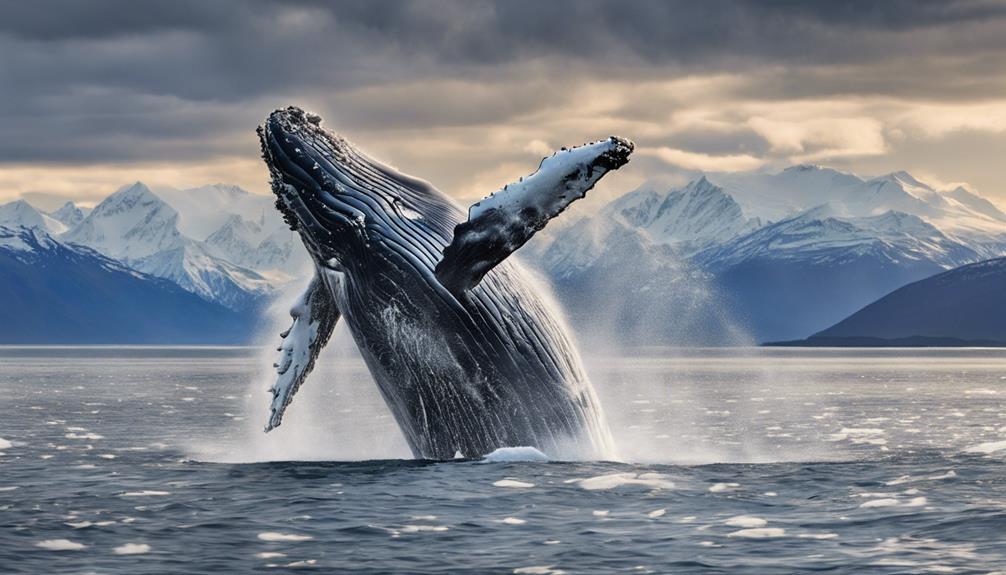
In the peak whale watching season in Alaska, which typically spans from mid-June to August, enthusiasts have the best opportunities to witness humpback whales and other species in their natural habitat. Humpback whales are commonly sighted during the summer months as they feed on small fish and krill.
Killer whales, also known as orcas, are best spotted in May and June near Ketchikan, Juneau, and Seward, hunting for seals and other marine mammals. Grey whales migrate to southern Alaska in late spring, showcasing their impressive breaching behaviors.
Blue whales, the largest animals on Earth, may be seen in July and August, traveling through Alaskan waters in search of food. Whale sightings can vary depending on the specific month of your Alaskan cruise, so choosing the right time within the peak season is important for maximizing wildlife watching opportunities while sailing through these majestic waters.
Best Time for Bear Spotting
Ideally situated between July and early September, the peak time for bear spotting in Alaska coincides with the salmon influx that attracts these magnificent creatures to the creeks and streams of the region. During this period, Grizzly bears can be observed in their natural habitat, offering a thrilling experience for wildlife enthusiasts. Royal Caribbean Cruise Tours in Alaska often include bear viewing excursions, enhancing the opportunity to witness these powerful animals up close. For best bear sightings, consider visiting during the salmon run in July, a time when bears are actively hunting for fish in creeks and streams, particularly in locations like Ketchikan. Alaska's diverse landscapes and ecosystems provide ample opportunities for bear viewing, from observing black bears to encountering majestic brown bears. Whether through guided tours or remote float plane trips, Alaska offers a range of experiences to witness these iconic creatures in their element.
| Best Time for Bear Spotting | |
|---|---|
| July | Salmon run |
| Early September | Grizzly bears |
| Creeks | Streams |
| Ketchikan | Royal Caribbean Cruise Tours |
Ideal Months for Eagle Sightings

The peak months for perfect bald eagle sightings in southeast Alaska are from May to September. During these months, as part of an Alaska cruise, birdwatching enthusiasts can witness the majestic bald eagles in their natural habitat. Southeast Alaska, home to around 30,000 bald eagles, offers ample opportunities for wildlife watching, especially near bodies of water where eagles are commonly spotted.
The Sitka Cultural Discovery excursion is a great way to observe bald eagles up close, as they're frequently seen near streams and bodies of water. With approximately 470 bird species in the region, including the iconic bald eagle, Southeast Alaska provides a diverse birdwatching experience for nature lovers.
Whether soaring through the skies or perched on branches overlooking the water, bald eagles are a common sight throughout the summer months in this pristine Alaskan wilderness. For those seeking unforgettable eagle sightings and a chance to immerse themselves in Alaska's rich wildlife, visiting during the peak months offers an unparalleled birdwatching experience.
Optimal Time for Otter Encounters
Best timing for observing otters in Alaska ranges from early spring through the end of July. During this period, the chances of encountering these enchanting creatures are at their peak. Here are some key points to keep in mind for prime otter encounters during your Alaskan cruise:
- Steller sea lions: While otters are more prevalent during spring and early summer, Steller sea lions can be spotted year-round in Alaska. Keep an eye out for these majestic marine mammals as they often share habitats with otters.
- Streams and creeks: Otters are frequently seen near streams and creeks, making these areas prime locations for wildlife watching. Cruise along these waterways to increase your chances of a memorable otter sighting.
- Wildlife tours: Participating in wildlife tours in Alaska can enhance your otter encounters. These tours often provide opportunities to get up close to Steller sea lions, with otters sometimes making surprise appearances alongside them.
- Sea otters near the ocean: Whether near the ocean or inland water bodies, otters are adaptable creatures that thrive in various environments. Keep a lookout for these playful animals during your Alaskan cruise for a truly immersive wildlife experience.
Conclusion
To sum up, our investigation confirms that the best time to go on an Alaskan cruise for wildlife watching is indeed during the peak season of July.
The abundance of wildlife sightings, perfect weather conditions, and increased chances of spotting bears, whales, eagles, otters, and other fascinating creatures make July the ideal month for an unforgettable Alaskan wildlife experience.
Don't miss out on this prime opportunity to witness the wonders of nature in their natural habitat.
- About the Author
- Latest Posts
Introducing Ron, the home decor aficionado at ByRetreat, whose passion for creating beautiful and inviting spaces is at the heart of his work. With his deep knowledge of home decor and his innate sense of style, Ron brings a wealth of expertise and a keen eye for detail to the ByRetreat team.
Ron’s love for home decor goes beyond aesthetics; he understands that our surroundings play a significant role in our overall well-being and productivity. With this in mind, Ron is dedicated to transforming remote workspaces into havens of comfort, functionality, and beauty.
-

 Decor7 days ago
Decor7 days agoMaximalist Decor Explained: Embrace More Style
-

 Vetted4 weeks ago
Vetted4 weeks ago15 Best Drip Irrigation Systems to Keep Your Garden Thriving
-

 Vetted2 weeks ago
Vetted2 weeks ago15 Best Foot Massagers for Neuropathy to Soothe Your Feet and Relieve Discomfort
-

 Vetted3 weeks ago
Vetted3 weeks ago15 Best Sports Laundry Detergents for Keeping Your Activewear Fresh and Clean
-

 Vetted3 weeks ago
Vetted3 weeks ago15 Best Tall Toilets for Seniors That Combine Comfort and Safety
-

 Vetted3 weeks ago
Vetted3 weeks ago15 Best Dish Scrubbers to Keep Your Kitchen Sparkling Clean
-

 Decor3 weeks ago
Decor3 weeks agoWhat Is Eclectic Home Decor
-

 Vetted4 days ago
Vetted4 days ago15 Best Organic Pest Control Solutions for a Naturally Pest-Free Home




